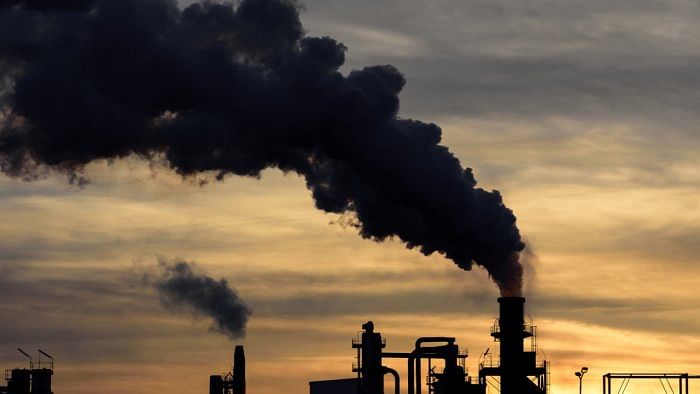
Reducing fossil fuel emissions could be relatively more beneficial than afforestation for the same amount of carbon removed from the atmosphere, a new study by scientists from the Indian Institute of Science (IISc) has said.
Jayakrishnan K U and Govindasamy Bala at the IISc's Centre for Atmospheric and OCeanic Sciences, performed two major sets of simulations in which fossil fuel emissions follow the extended shared socioeconomic pathway (SSP 2-2.5, 3-7.0 and 5-8.5) scenarios.
Also Read | Not isolated, academics say of IISc controversy
The SSPs are used to calculate greenhouse gas emission scenarios with different climate policies. The researchers used long-term land use data and performed a historical simulation from 1750 to 2005 by prescribing historical fossil fuel emissions, cover change and volcanic forcing. The dynamic vegetation model of University of Victoria.
In the fossil fuel model, the forest cover remained the same while the afforestation model saw the green cover double, including afforestation in the abandoned agricultural fields.
The results show that allowing forests to grow back by abandoning all agricultural land in the year 2005 till 2500, leads to additional storage of 319.84, 418.93 and 379.21 petagrams of carbon in the SSP 2-4.5, SSP 3-7.0 and SSP 5-8.5 scenarios, respectively.
However, the cooling effect of afforestation is completely offset by its warming effect in the higher-emission scenarios (SSP 3-7.0 and SSP 5-8.5). "The biophysical warming effect of the regrowth of trees does not completely offset the biogeochemical cooling effect from the atmospheric carbon removal by afforestation. This suggests that afforestation may have a larger climate benefit in the lower-emission scenarios," it said.
The simulation showed that reducing fossil fuel leads to "more cooling" at 0.36 degrees, 0.47 degrees and 0.42 degrees Celsius during the three emission pathways. "If the fossil fuel emissions are reduced by the same amount of carbon additionally stored in the land, the climate is cooler in the reduced fossil fuel emission case compared to the afforestation case," the study said.